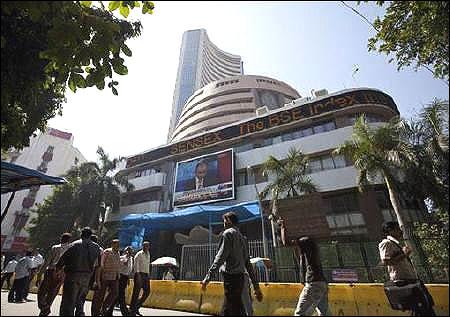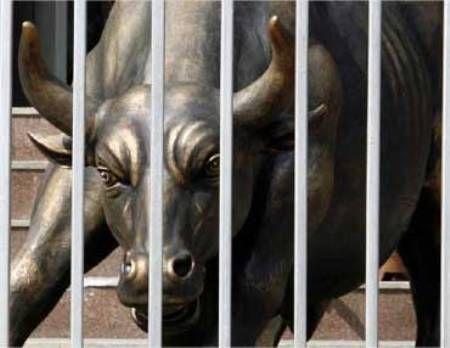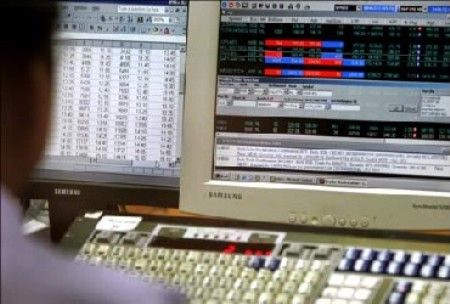 | « Back to article | Print this article |
Downgrades in earnings loom for Sensex firms
The risk of further downgrades in earnings has increased, thanks to Thursday's lower GDP numbers. The consensus Sensex earnings for financial year 2013 have already been lowered by about 14 per cent in last one year to about Rs 1,280 currently (see chart: Different earnings scenarios).
At current levels, the market is building expectations of Sensex earnings growing in the region of 16 per cent in 2012-13. However, looking at the GDP data and the recent cut in GDP growth estimates as well, there is a possibility the earnings growth expectations will be toned down. In fact, some brokerages have already started factoring this.
"While the possibility of de-growth is rising with the pronounced slowdown in the economy, our base scenario is that we will see EPS growth of zero-five per cent for the Sensex in FY13," says Saurabh Mukherjea, head of equities at Ambit Capital. While Mukherjea's estimate is far lower than consensus expectations, he says, "To the extent that some brokerages have more optimistic forecasts than ours, they are likely to throttle their numbers back."
Given the current environment, experts say the 16 per cent growth figure is too high to expect. "I do not think 16 per cent growth is possible, and we should not even talk about it. In the current context, we are expecting nine per cent growth in the earnings (of Sensex companies) in FY13," says Rajat Rajgarhia, director of research at Motilal Oswal Securities.
| DIFFERENT EARNINGS SCENARIOS | ||||||
| If FY13 EPS grows at (%) | ||||||
| FY12E | FY13E | 10 | 8 | 6 | 4 | |
| EPS (Rs ) | 1,100 | 1,280 | 1,210 | 1,188 | 1,166 | 1,144 |
| PE (x) | 14.5 | 12.5 | 13.2 | 13.4 | 13.7 | 14 |
| E: Estimate; current FY13 EPS estimate assumes a growth of 16.36% at current level of 15,965 on the Sensex; x: multiple Source: Bloomberg, BS | ||||||
Click on NEXT for more...
Downgrades in earnings loom for Sensex firms
Analysts had toned down their expectations, as a result of which the market had seen a large number of earnings downgrades in the second half of 2011. Thereafter, the sentiment improved (the central bank cut the repo rate, the markets rallied, foreign institutional investors poured in huge sums of money, etc) and, hence, most of them were thinking there was no need for further downgrades.
However, that will change as lower economic growth expectations will automatically bring down expectations from individual sectors and the companies therein.
For instance, there are certain sectors wherein the growth rates are largely directly correlated to GDP growth - cement and steel fit here. Likewise, with the India Inc capex and infra spending slowing, it will reflect on the overall numbers.
Recently, leading global research houses cut their 2012-13 GDP estimates for India. For instance, Goldman Sachs cut its GDP estimate to 6.6 per cent from 7.2 per cent, Bank of America-Merrill Lynch reduced its estimate to 6.5 per cent from 6.8 per cent earlier, while Morgan Stanley lowered its forecast from 7.5 per cent to 6.8 per cent.
Downgrades in earnings loom for Sensex firms
This is a significant cut and a broader trend, the reflection of a moderation in economic activity and the currency risk. "Incoming economic data suggest that after a modest uptick at the start of 2012, economic activity seems to be decelerating again.
Thus, auto sales, cement dispatches, railway freight, and PMI, have all decelerated in the last couple of months relative to the January-February levels," says Ashutosh Datar, analyst at India Infoline, in a recent report.
"The macro environment is challenging, and conviction in the earnings outlook is low. However, equities are cheap, and that is usually when they generate returns. Hence, we are constructive on stocks. That said, markets have not priced in tail risks, in our view," Ridham Desai of Morgan Stanley said in a recent note on India.
Click on NEXT for more...
Downgrades in earnings loom for Sensex firms
The moderation in economic growth and cut in 2012-13 GDP estimates is bound to have an impact on consensus earnings.
But, to what extent will it hurt earnings? "There are pressures across the board and there is a risk to earnings. It is possible that earnings growth could come in the region of just four-five per cent, but that does not seem to be the case as of now," says Rajgarhia, who is factoring in a nine per cent increase in earnings.
Analysts believe there could be more downgrades, which will depend on individual views, as the trend of lowering earnings estimates picks up. That will bring down the consensus Sensex earnings for FY13 from the current Rs 1,280 levels.
Depending on what level the consensus earnings estimate falls to, the valuation equation will also change. That's because the Sensex, which currently appears reasonably priced at 12.5 times the FY13 consensus earnings, could suddenly look relatively expensive at 14 times (assuming four-five per cent growth in earnings).




